Hugo Nomination Thoughts, 2017
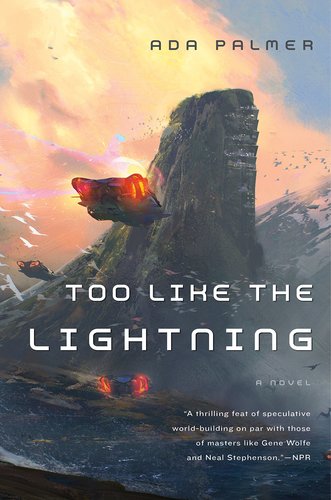 |
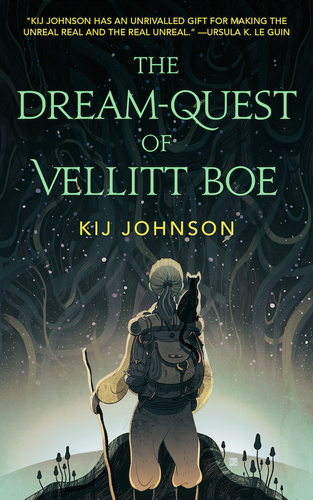 |
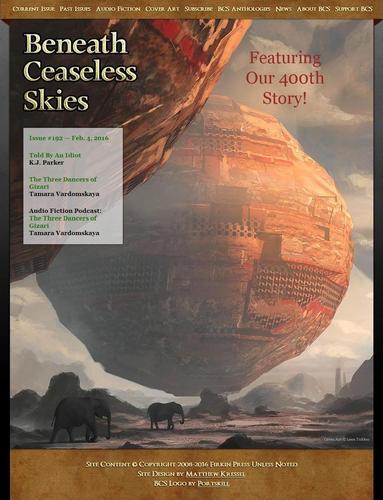 |
It’s that time again, right? Hugo nominations are open, and they will close on March 17th. I’ll be discussing most of the categories, but as usual, I’m better informed about short fiction than anything else.
I should mention going in that there have been some significant changes to the Hugos. There is a new Hugo Category, for Best Series. (I don’t like the idea much, but I’ll play along.) There is a new non-Hugo for Best Young Adult Book, up for ratification in Helsinki for a potential award next year. There are changes to the voting process: now there will be 6 nominees instead of 5 (though each nominator still just votes for 5), and the 5% rule (that each story on the final ballot must appear on 5% of the nominating ballots) has been eliminated. And the EPH process for counting the final votes has been approved. I won’t try to explain that – there are much clearer explanations than I could offer readily available.
One more note to begin with – though I participate with a lot of enjoyment in Hugo nomination and voting every year, I am philosophically convinced that there is no such thing as the “best” story – “best” piece of art, period. This doesn’t mean I don’t think some art is better than other art – I absolutely do think that. But I think that at the top, there is no way to draw fine distinctions, to insist on rankings. Different stories do different things, all worthwhile. I can readily change my own mind about which stories I prefer – it might depend on how important to me that “thing” they do is (and of course most stories do multiple different things!) – it might depend on my mood that day – it might depend on something new I’ve read that makes me think differently about a certain subject. Bottom line is, in the lists below, I’ll suggest somewhere between 5 and 8 or so stories that might be on my final ballot. Those will be in no particular order. And the other stories I list will all really be about as good – and I might change my mind before my ballot goes in.
The other obvious point to make is that the great bulk of these stories are those that I included in my yearly anthology. There are a few that didn’t make it, for reasons of length, contractual situation, balance, or even that I might have missed a story by the deadline for the book.
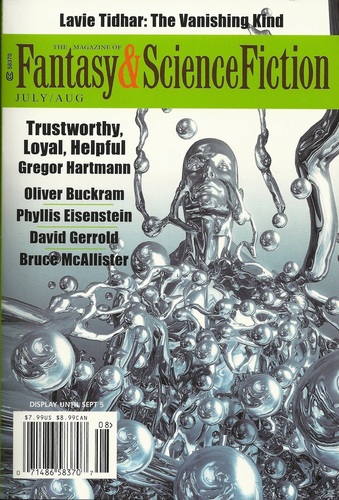 |
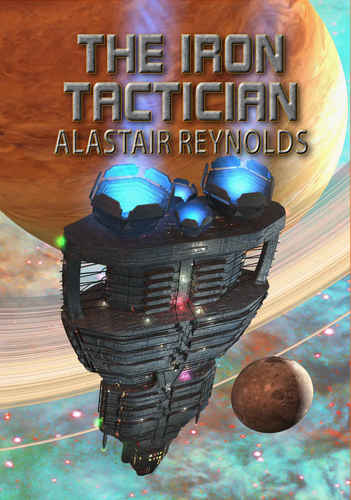 |
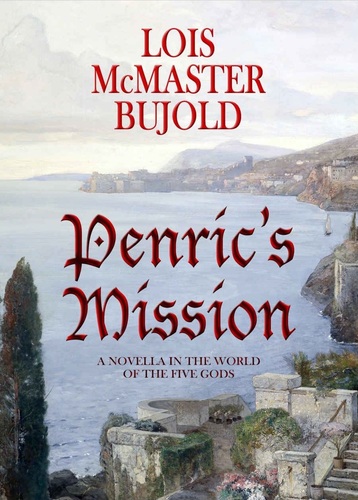 |
Novella
The Dream-Quest of Vellitt Boe, by Kij Johnson (Tor.com Books)
“The Vanishing Kind,” by Lavie Tidhar (F&SF, July/August)
“Lazy Dog Out,” by Suzanne Palmer (Asimov’s, April/May)
“Maggots,” by Nina Allan (Five Stories High)
The Iron Tactician, by Alastair Reynolds (NewCon Press)
The Ballad of Black Tom, by Victor LaValle (Tor.com Books)
The Last Days of New Paris, by China Mieville (Del Rey)
Penric’s Mission, by Lois McMaster Bujold (Spectrum Literary Agency) [technically just slightly too long to be eligible in the Novella category]
Technologies of the Self, by Haris A. Durani (Brain Mill Books)
The Jewel and Her Lapidary, by Fran Wilde (Tor.com Books) [technically a novelette at some 16,900 words, though also eligible in Novella]
In this category, there are only two stories included in my book – that’s always the way, with novellas – they take up so much space that I can only fit a couple per year. The top five stories listed will almost certainly be on my Hugo nomination ballot. That said, there are a few significant novellas I have not yet read, so there is some room for change. But to quickly cover my putative nominees:
The Dream-Quest of Vellitt Boe is a truly lovely story, taking its inspiration and setting from H. P. Lovecraft’s “The Dream-Quest of Unknown Kadath,” but more importantly, written as well as the work of the writer Lovecraft was under the influence of when he wrote his story: Lord Dunsany. The title character is a professor at a women’s college who must chase after a student who has foolishly run away with a man from our world.
“The Vanishing Kind” is dark noir set in an alternate England, under the sway of a Nazi government, having lost World War II. A German screenwriter comes to London partly in pursuit of an actress who had briefly been his lover, only to find her involved in some very scary things – drugs, sex-trafficking, murder – not to mention hidden Jews.
“Lazy Dog Out” is traditional SF adventure, and lots of fun, about a space tug pilot on a moon of a colony planet, who gets stuck in the middle of a nasty plot involving framing some unfortunates for the murder of some visiting aliens.
“Maggots” is a long story about a young man from the North of England who becomes convinced that his Aunt, after a mysterious disappearance and reappearance, has been replaced by something alien. This ends up messing up his relationship with his girlfriend, and he ends up in London, tracking down hints of other people who’ve had similar experiences as his – which leads him to a spooky house where he encounters something really scary, as well as learning a lot about his Aunt that he hadn’t known.
The Iron Tactician is the latest Merlin story from Alastair Reynolds, set in a far future in which humanity is threatened with destruction by Berserker-like robots called Huskers. This story, set more or less to the side of the main action, has Merlin encountering a ship destroyed by the Huskers, with one survivor, who leads him to a system riven by war, which may have a syrinx to replace Merlin’s decaying one. The story truly turns on the nature of the AI which one side of the war has used to plan their campaigns, the Iron Tactician, and on its real nature and motivations. The story starts a bit slow but is resolved really effectively.
I’m not a horror fan, not a Lovecraft fan, which is one reason I resisted Victor LaValle’s The Ballad of Black Tom. And it is Lovecraftian horror, though with a distinct twist. Still – not my favorite stuff – but I have to say this is a pretty strong story regardless. It’s set in New York in the ‘20s, about a black man, a bit of a con man, who becomes involved with a rich white man who believes he can summon the Old Ones from the depths – and so perhaps he can, but if he calls them will they do what he wants? And will Black Tom care? Solid work, and really well written in spots, but in spots written a bit carelessly, as if it needed one more draft.
The Last Days of New Paris is subtitled “A Novella,” so I list it here. Its main part is perhaps 39,000 words, which qualifies it as a novella, but there is a long section of endnotes, which brings it to well over 45,000 words, so I’ll leave the question of its eligibility for the Best Novella Hugo to others. But it’s very interesting, set in an alternate Paris during and after World War II. In this Paris a curious weapon has brought Surrealist art to life, with ambiguous effects, and Thibaut, the main character, along with an American spy named Sam, negotiates the city and the Nazis’ efforts to use their art as weapons in an attempt at, perhaps, escape – or, perhaps, an encounter with some arguably more threatening than the Nazis. As I said, it’s pretty interesting, but I thought it perhaps a bit too much a really neat idea looking for a story and not really finding one. (To be fair, there really is a story here, just not one I was entranced by. But, the central idea is very cool indeed.)
I ought to say something as well about the other two novellas I mention. Technologies of the Self is about Joe (real name Jihad), a Dominican-Pakistani-American growing up in New York, and a faithful Muslim in post-9/11 New York, also an engineering student, a young man a bit shy around women, proud of his Dominican heritage and his family’s long history of exile. The SFnal part concerns his Uncle Tomas, particularly his repeated encounters with a creature he thinks is a demon called Santiago (but who might be a strange time traveler, or a person from a parallel world, or all of the above). Cool and involving work about the main character’s identity (or identities). And The Jewel and Her Lapidary also has a cool central fantastical idea: a valley protected from outsiders by powerful jewels that are wielded by the ruling family (“Jewels”) but controlled by Lapidaries who each bond to a single Jewel. This story concerns the betrayal and fall of the valley, leaving one surviving Jewel and her Lapidary, both fairly insignificant young women. They must find a way to resist the invaders, and at least to prevent them using the valley’s mines to supply jewels to allow them to cement and extend their conquest.
[I had previously mentioned Penric’s Mission as a potential Novella nominee, and my favorite so far of Bujold’s three self-published novellas set in her World of the Five Gods. Penric is a young man who in the first story became the host to a demon (that he calls “Desdemona”), which makes him a sorcerer. In this story he travels to another country to try to recruit a popular General for the Duke he’s working for, and ends up enmeshed in local politics, with the General blinded, and Penric trying to help, and falling for the General’s widowed sister in the process. Fun stuff, with some interesting magic. However, I am told that this story is 300 words too long to be eligible for Best Novella.]
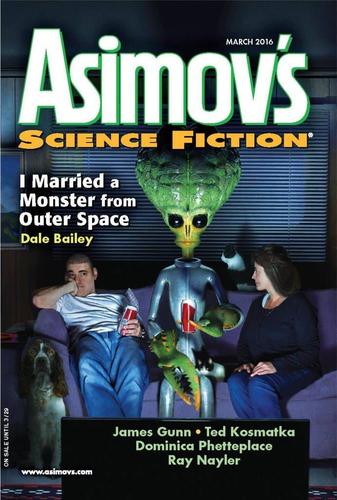 |
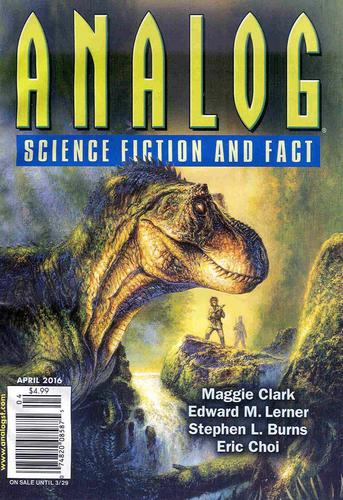 |
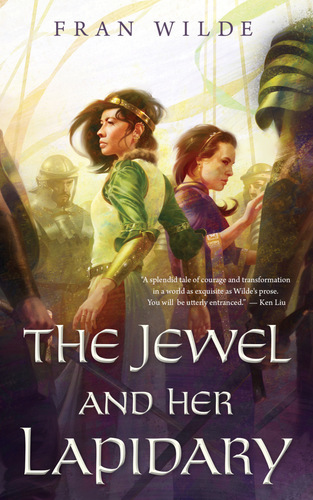 |
Novelette
“Everybody From Themis Sends Letters Home,” by Genevieve Valentine (Clarkesworld, October)
“Project Empathy,” by Dominica Phetteplace (Asimov’s, March)
“The Visitor From Taured,” by Ian R. MacLeod (Asimov’s, September)
“The Bridge of Dreams,” by Gregory Feeley (Clarkesworld, April)
“Told By An Idiot” by K.J. Parker (Beneath Ceaseless Skies, February 4)
“Seven Ways of Looking at the Sun-Worshipers of Yul-Katan,” by Maggie Clark (Analog, April)
“Blood Grains Speak Through Memories,” by Jason Sanford (Beneath Ceaseless Skies, March 17)
“Fifty Shades of Grays,” by Steven Barnes (Lightspeed, June)
“The Plague Givers,” by Kameron Hurley (Patreon; Uncanny, May)
“Alone, on the Wind,” by Karla Schmidt (Clarkesworld, August)
The Jewel and Her Lapidary, by Fran Wilde (Tor.com Books)
Again, the top five listed here will likely make up my ballot.
Quick word count note to begin – according to my word counts a few short stories on my list are also eligible in novelette, and a couple of them are right at 7500 words – the boundary between short story and novelette. So those stories may well be listed as novelettes in others’ lists. (Actually, I’m planning a post on the whole notion of word count boundaries for award categories, and on the history of designating stories as “short story” vs. “novelette” vs. “novella” vs. “short novel” etc.)
Anyway, to the novelettes:
“Everybody From Themis Sends Letters Home” is a really moving story about a group of “beta-testers” for a new virtual reality game who think they are the first colonists on a planet of Proxima Centauri. The braids of the story encompass their experiences on this fictional planet, their experiences “back home” (especially as they have been recruited from the prison population), and the corporate ethical missteps (to put it mildly) surrounding the whole project – and, too, behind it all, is a sort of paean (or so I read it) to the love of story. (I really love Genevieve Valentine’s work, which I find consistently as emotionally engaging as that of any writer.)
Dominica Phetteplace is a fairly new writer, who has been impressive from the getgo, but “Project Empathy” is the first story from her that really wowed me. It’s the first of a series of stories (all so far in Asimov’s, all with titles beginning “Project”) that are going to be a “braided novel.” This story concerns a high school age woman from the economically depressed suburbs of San Francisco who gets a sort of commercial scholarship to a school in the city, in the process agreeing to host an AI that will make her a better worker at the coffee shop/restaurant sponsoring her scholarship. The AI, we soon learn, has its own agenda … and the agendas of various AIs turn out to be a significant narrative impetus in the larger novel.
“The Visitor From Taured” is about a man who is obsessed with proving the existence of parallel worlds. The story is told by his college friend, a woman who becomes an expert in 20th Century books (books not being a thing anymore in this future), enough so that (fortuitously) she ends up being able to help him finance the necessary experiment. The story is told beautifully, and resolves to a certain bittersweet melancholy but not at all despairing mood that seems characteristic of MacLeod, seems to me. It’s in a way another story about the SF dream, and its failure. But that might be me imposing my personal obsessions on it. Anyway, it’s really fine work.
“The Bridge of Dreams” is very far future exotic hard SF story, intriguingly Norse-flavored, with a pair of posthumans summoned from the outer planets to the “Sunlit Realms” (the Inner Solar System, particularly Venus) to intervene in a political struggle between “kobolds” and latter day Earth people. This is SF at its weirdest, legitimately strange and convincingly not just contemporary people in funny suits.
“Told By an Idiot” is set in a perhaps slightly alternate Elizabethan England, and is stuffed with neatly turned Shakespearean allusions, in telling of a lucky man (owner of a playhouse), who happens to acquire a bottle that just might have a demon inside it. As clever and knowing as we expect from Parker, and of course as cynically funny, and bitterly logical.
I mentioned the useful weirdness of Greg Feeley’s “The Bridge of Dreams,” and in that context I ought to mention some other stories on this list that are really weird – “Blood Grains Speak Through Memories,” “The Plague Givers,” and “Alone, on the Wind,” particularly. All, to some degree or another, might be called “Science Fantasy,” in that they use both SFnal and Fantastical imagery. (Mind you, “The Bridge of Dreams” is most definitely SF, while “The Plague Givers,” I would say, falls on the Fantasy side of the divide, with the other two stories perhaps straddling the border.) I think there’s something there – perhaps a Clarke’s Law derivation – a really useful way of depicting the far future is to acknowledge that to us in its distant past the far future will probably really seem like fantasy.
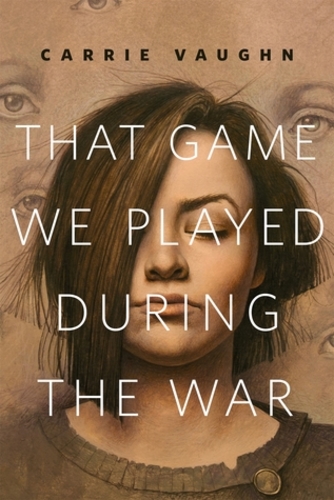 |
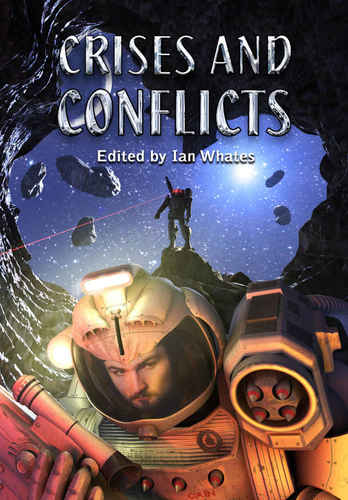 |
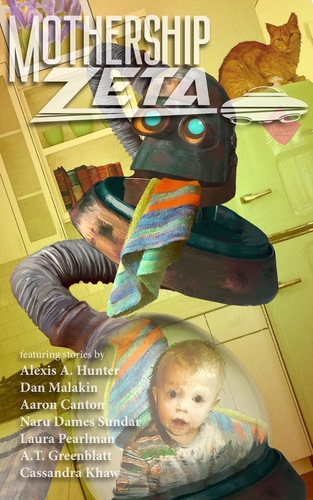 |
Short Story
“Empty Planets,” by Rahul Kanakia (Interzone, January/February)
“Red in Tooth and Cog,” by Cat Rambo (F&SF, March/April)
“RedKing,” by Craig de Lancey (Lightspeed, March)
“That Game We Played During the War,” by Carrie Vaughn (Tor.com, March)
“All That Robot Shit,” by Rich Larson (Asimov’s, September)
“Openness,” by Alexander Weinstein (Beloit Fiction Journal, Spring)
“Between Nine and Eleven,” by Adam Roberts (Crises and Conflicts)
“Gorse Daughter, Sparrow Son,” by Alena Indigo Anne Sullivan (Strange Horizons, August 1st and 8th)
“In Skander, for a Boy,” by Chaz Brenchley (Beneath Ceaseless Skies, January 21)
“Laws of Night and Silk,” by Seth Dickinson (Beneath Ceaseless Skies, May 26)
“Ozymandias,” by Karin Lowachee (Bridging Infinity)
“A Fine Balance,” by Charlotte Ashley (F&SF, November/December)
“Rager in Space,” by Charlie Jane Anders (Bridging Infinity)
“Innumerable Glittering Lights,” by Rich Larson (Clockwork Phoenix 5)
“Dress Rehearsal,” by Adrian Tchaikovsky (Now We Are Ten)
“Something Happened Here, but We’re Not Quite Sure What it Was,” by Paul McAuley (Tor.com, July)
“I’ve Come to Marry the Princess,” by Helena Bell (Lightspeed, November)
“A Non-Hero’s Guide to the Road of Monsters,” by A. T. Greenblatt (Mothership Zeta, July)
“Things With Beards,” by Sam J. Miller (Clarkesworld, June)
“The Magical Properties of Unicorn Ivory,” by Carlos Hernandex (The Assimilated Cuban’s Guide to Quantum Santeria)
Lots of stories listed there, and they are all good stuff. Noticeable is, of course, Rich Larson, who really had an excellent year. I think there’s a nice mix, too, of fantasy and SF, some funny stories, some quite dark, hard SF, far future SF, action, philosophy. I’m leaning towards the top five listed stories (though, really, as with the other categories, all these stories are worthy) for my nomination ballot. To consider those a bit further:
“Empty Planets” is an achingly beautiful and rather melancholy story set in the very far future, with a diminishing human race realizing it is alone in the universe. The story focuses on two people from the younger generation, one of who, a “recontactee” from a generation ship, looks for evidence of intelligence among distant gas clouds.
“Red in Tooth and Cog” is a sometimes whimsical, clever, and also quite affecting, story about abandoned robots in a city park who have created their own ecology. The combination of sweetness and sharp imagination really grabbed me.
“RedKing” tells of the title computer game, that causes its users to become killers, and a “code monkey” whose job is to analyze the software, both to understand what makes is dangerous, and to find evidence against the maker – but that job is by its nature dangerous. It’s a slick, exciting, and scary story.
“That Game We Played During the War” is a moving piece set in the aftermath of a war between a telepathic race and non-telepaths, and two people who met during the war, and played chess together, working out how to play even while one is a telepath, and how they try to come to terms with peace.
“All That Robot Shit” is (I believe) Rich Larson’s preferred title for the story published in Asimov’s as “All That Robot ….” It’s about a robot and a human after an apocalypse of some sort – which means there probably aren’t many more humans – and about the robot’s cooperation with the human – but more importantly his love for another robot.
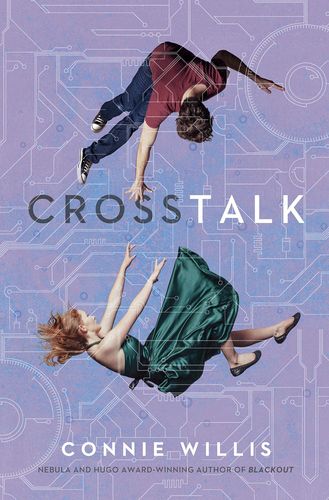 |
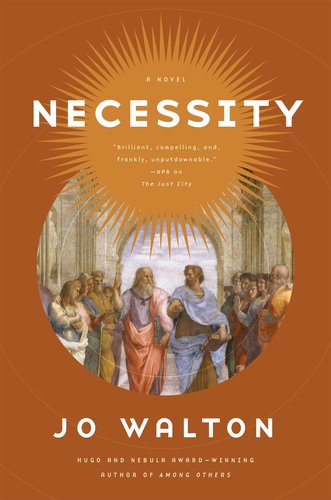 |
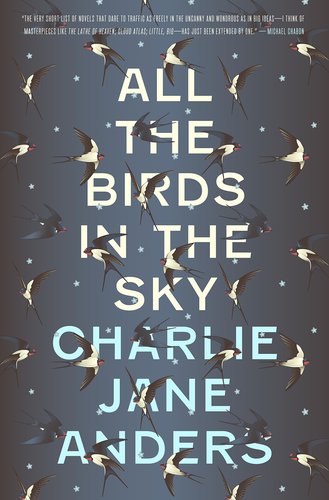 |
Hugo Nomination Thoughts, Long Fiction (and Dramatic Presentation)
In past years, “Long Fiction” just meant “Novel,” but this year there are two other categories to consider, one in its first year as an award, the other up for ratification in order to be awarded next year. The first is a Hugo for Best Series, the other, for Best Young Adult Fiction, is not officially a Hugo Award, but voted on by the same population using the same rules (as with the Campbell Award for Best New Writer). It does not yet have a name, the best option (Andre Norton Award) already being taken for the similar award given by SFWA.
So this is the point where I confess that I read so much short fiction that I’m not qualified to rule on Best Novel. I’ve said this every year for the past few years. I always end up reading my favorite novels a bit too late – so, for instance, I think the best SF novels of 2014 were Emily St. John Mandel’s Station Eleven and William Gibson’s The Peripheral, but I didn’t read them until 2016. Likewise, for 2015, I didn’t read Jo Walton’s The Just City until after the Hugos were awarded, and I didn’t finish my favorite 2015 novel, The Buried Giant by Kazuo Ishiguro, until early 2017. There are, thus, plenty of 2017 novels I think might be excellent that I haven’t yet read, including The Gradual, by Christopher Priest; Everfair, by Nisi Shawl; Necessity, by Jo Walton; The Winged Histories, by Sofia Samatar; Central Station, by Lavie Tidhar; and Crosstalk, by Connie Willis. Those five I already have on hand, and definitely will read, perhaps very soon. I am sure there are many more. And all that said I can only recommend two novels from 2017 that I have already read and liked a lot, both, as it happens, first novels. (I suppose technically there are two more pretty good novels that I read and marked as novellas, but both are eligible as novels: Penric’s Mission, by Lois McMaster Bujold; and The Last Days of New Paris, by China Miéville. One more pretty good novel, also pretty short but longer than novella length, I think, is Walter Jon Williams’ Impersonations, his latest Praxis story.)
The two first novels I mentioned are All the Birds in the Sky, by Charlie Jane Anders; and Too Like the Lightning, by Ada Palmer. Both are fairly seamless mixtures of SF and Fantasy (though Palmer’s novel reads like pure SF with a difficult to explain fantastical intrusion, while Anders’ novel reads like Fantasy set in a pretty SFnal near future.) All the Birds in the Sky is the story of Patricia, who can talk to birds, and Lawrence, who has invented a two-second time machine, as they grow up, both somewhat dysfunctionally, and end up friends and sometime lovers in a near future facing imminent collapse due to global warming. Both promote solutions – Patricia’s fantastical, Lawrence’s science-fictional, and both make terrible mistakes, before a literally earth-shaking conclusion. It’s funny – Anders is always funny – and serious as well (Anders is usually serious too). I really liked it. Too Like the Lightning is set several centuries in the future, in a world divided into “Hives,” cooperative family-like organizations with different strengths. The narrator is Mycroft Canner, who, we slowly learn, is a criminal (and the nature of his crime, only late revealed, is pretty appalling), but who is also quite engaging, and an important mentor to an amazing child who can bring inanimate things to life. This novel introduces a conflict – a threat to the world’s balance of power – and also intricately sketches the complex background of this future, and introduces a ton of neat characters. Then it stops, which is its main weakness – it is but half a novel. The sequel (Seven Surrenders) is due in March 2017. In the end I was impressed but unsatisfied – leaving a novel perhaps not quite Hugo-worthy (though the author is surely Campbell-worthy!), but a novel which will compel me to read its sequel, which, if it sticks the dismount, might be Hugo-worthy itself.
Speaking of first novels, one that I haven’t read but definitely need to get to is Ninefox Gambit, by Yoon Ha Lee. Lee has been doing really outstanding work for a long time — I’ve used a few of his stories in my anthologies, and in a way it’s a surprise that his first novel is only coming out now. But it looks very interesting indeed.
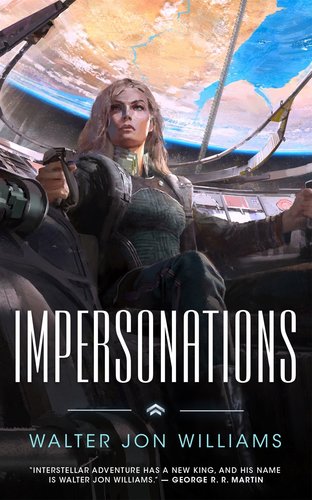 |
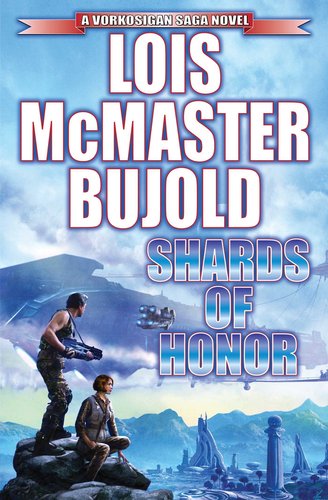 |
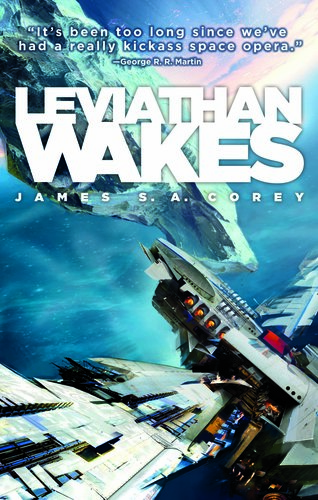 |
Best Series
Considering this brand new category reminds me of one novel that I have just read, Impersonations, by Walter Jon Williams, a new pendant to his Praxis (or Dread Empire’s Fall) series. It’s a fun story, and I’m glad I read it, but I don’t think it’s Hugo-worthy by itself. I am strongly considering nominating the entire series for a Hugo, however.
And, indeed, that hints at one of my misgivings about the Hugo for Best Series. The most recent entry in a series may not be particularly representative of the series as a whole, nor as good as the rest of the series. The same comment, obviously, applies to Lois McMaster Bujold’s Vorkosigan series, represented in 2016 by the rather pedestrian Gentleman Jole and the Red Queen. I would say personally that both Bujold’s Vorkosigan series and Williams’ Praxis books are worthy, over all, of a Best Series Hugo, but that the best time to award them that Hugo has passed. (Which, to be sure, is primarily a function of this being a brand new award.)
At any rate, I was wondering what the possible candidates for Best Series, eligible in 2016, might be, and I was delighted to find that JJ, over at File 770, had done the heavy lifting, producing this page with a good long list of potential eligible series.
Of those my personal favorites are:
Dread Empire’s Fall, by Walter Jon Williams
The Vorkosigan Series, by Lois McMaster Bujold
The World of Five Gods, by Lois McMaster Bujold
The Expanse, by James S. A. Corey
The Fairyland Books, by Catherynne S. Valente
The Laundry Files, by Charles Stross
The Liaden Universe, by Sharon Lee and Steve Miller
The RCN Books (Leary/Mundy), by David Drake
Riverside, by Ellen Kushner
Temeraire, by Naomi Novik
Thessaly, by Jo Walton
And immediately I see a problem – common to series, I think. While I’ve read and enjoyed many books in each of these series, I’ve fallen behind in many of them. I didn’t even know there were new entries in Ellen Kushner’s Riverside series or David Drake’s RCN books. (Which, by the way, isn’t a bad thing from my point of view – I’ll be glad to grab the new books in both of those series.) (And, hey, speaking of problems with the Best Series Hugo, does Delia Sherman get a Hugo too if the Riverside series wins, as she co-wrote one of the major novels in that series, The Fall of the Kings? [I think the answer is “Yes.”])
There’s also a big difference in the types of these series. Some comprise several books with a fairly coherent story arc: certainly Jo Walton’s Thessaly books are a pretty tight trilogy; and the Temeraire and Expanse series, a bit more loosely, are still pretty coherent. Some represent mostly just a universe in which to set stories, with perhaps some sub-arcs: the Liaden books, the RCN books, the Vorkosigan books, for example. Dread Empire’s Fall was originally a closely unified trilogy, since followed by two much shorter pendants (one about each of the two main characters of the original trilogy). I suppose this is not really a fatal problem – the voters can judge for themselves how to evaluate each of these types of series.
To be honest, I’m not sure what, or even if, I’ll nominate. I will see if I can catch up in a couple of the series I like but am behind in. There’s a good chance I’ll nominate Kushner’s series, because I think it deserves the attention. Beyond that, I just don’t know. I have enjoyed books in each of the series I listed – I wouldn’t be bothered by any of them winning a Hugo (though many of them – not that this is a bad thing, mind you – represent lighter entertainment than we often think of for the Hugos – possibly this is partly the nature of long series.)
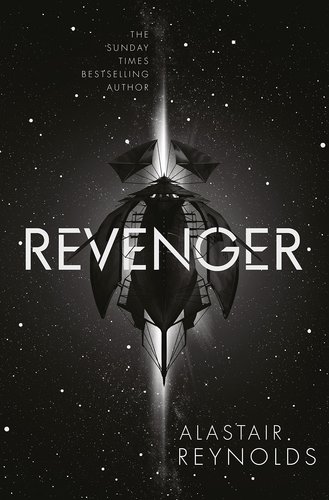 |
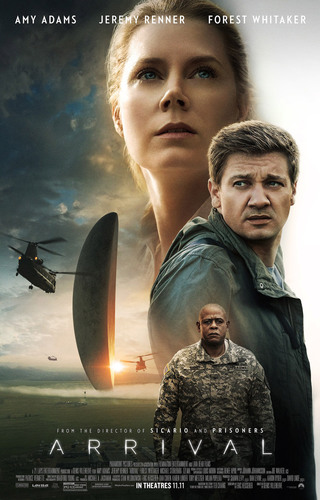 |
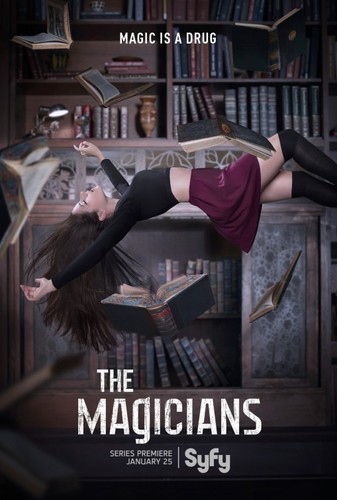 |
Best YA Novel
This will first be awarded next year, if ratified in Helsinki. As I mentioned, it is not a Hugo, but it will be administered and awarded by the World Science Fiction Society. In case anyone wanted to see what were potential candidates this year, well, I have little to say – I really haven’t read enough books in this category to make any ruling or recommendations. I can recommend a look at the Locus Recommendation list, which includes a section on YA novels. I will say that I’m intrigued by the presence of Alastair Reynolds’ Revenger, which I didn’t know was YA. And I’m sure that many of these books are very good work indeed – but I haven’t read them, so further deponent sayeth not.
Dramatic Presentation
To my mind, this is one of those years in which the Hugo for Best Dramatic Presentation, Long Form, should be awarded by acclamation, to Arrival, an excellent film based on one of the very best SF stories of all time, Ted Chiang’s “Story of Your Life.” Of course, being based on a good story doesn’t guarantee a good film (as those who have seen the movie version of “Nightfall” can testify, or so I am given to understand) – but Arrival is a very good film (if not, to my mind, quite as good as the original story, which is hardly a complaint, as the original story is so great).
Beyond that, I will say that I enjoyed Rogue One, but didn’t love it – it will probably get a nomination, and deservedly enough I suppose, but it would be a disgrace if it won. I have seen suggestions that Hidden Figures could be nominated – that seems silly to me, but I suppose it would get the Apollo 13 exception. (If so, can I nominate Michael Chabon’s Moonglow for Best Novel?) I don’t really have any other obvious candidates.
As for Short Form, I don’t watch Doctor Who so I’m not allowed to nominate. (Joke!) Actually, I don’t watch that much TV – I just started on The Magicians, which I am enjoying so far, and I suspect I would like The Expanse, and I know there’s lots of other cool stuff out there. But I haven’t seen enough to judge.
Other Categories
In the remaining categories (as, really, with all the categories except short fiction) I do want to emphasize what may be obvious – these are people and things that I personally enjoyed, but I know there’s a lot of excellent work I’ve missed. I’ll be nominating things that impressed me, but I’ll be glad to check out the stuff other people nominate.
Best Fan Writer
The first thing I’ll do here is mention myself. I am a fan writer (at least my blog writing and my stuff for Black Gate qualifies, if perhaps not my work for Locus, which I guess is now officially professional). I would note in particular my reviews of old magazines at Black Gate, particularly Amazing and Fantastic in the Cele Goldsmith Lalli era, and my various reviews of Ace Doubles (and other SF) at Strange at Ecbatan (and often linked from Black Gate.) I would be greatly honored if anyone thought my work worthy of a Best Fan Writer nomination.
But of course there are many wonderful fan writers out there. For years I have been nominating Abigail Nussbaum, especially for her blog Asking the Wrong Questions, and I see no reason not to do so again this year. I will note in particular her review of Arrival, which captured beautifully the ways in which the movie falls short of the original story, but still acknowledges the movie’s strengths.
Another fan writer who has attracted my notice with some interesting posts is Camestros Felapton. Some of the most interesting work there regarded (alas) the Puppy Kerfuffles, and I was quite amused by this Map of the Puppy Kerfuffle. But the blog is much more than Puppy commentary – indeed, it’s much more than SF commentary. In the more traditional fanwriting area, I can point to the most recent entry (as I write), a well-done review of Greg Egan’s Diaspora.
Another possibility is Greg Hullender at Rocket Stack Rank. The site is run by Greg along with his partner Eric Wong, and both deserve a lot of credit – I mention Greg in particular because of articles like his analysis of the effect of slate voting on the 2016 Hugos.
One of my favorite fan writers does a lot of his stuff in a place relatively few people see, but he has begun to review Amazing Stories for Galactic Journey. This is John Boston, and his work can be found here. The conceit at Galactic Journey is that magazines from 55 years ago are reviewed, with an attempt to make the reviews reflect only knowledge up to the point of publication of the magazine. (It will be obvious to anyone who reads my stuff at Black Gate that this sort of thing is right up my alley, and in particular that reviews of Amazing from the early ‘60s are of special interest, as I am (in a somewhat less disciplined fashion) trying to look at and write about as many issues of Amazing and Fantastic edited by Cele Goldsmith Lalli as I can.)) A couple of years ago John (along with Damien Broderick) published a series of books reviewing every issue of New Worlds and Science Fantasy from the Carnell era, which gives another look at his credentials as a fan writer.
And finally I think there are a number of people at Black Gate worthy of a look. Too many to mention, perhaps, but one who definitely deserves recognition is the editor, John O’Neill, who also does a great deal of writing for the site.
Best Fanzine
Mentioning sites like Black Gate, Galactic Journey, and Rocket Stack Rank immediately brings to mind the Best Fanzine category. I plan to nominate each of these sites for a Best Fanzine Hugo. I’m particularly partial in this context to Black Gate, primarily of course because I have been a contributor since the print days (issue #2 and most of the subsequent issues). Black Gate was nominated in this category each of the past two years, but we declined the nomination due to the taint of (unwanted) presence on the Rabid Puppy slates. (I had suspected, and Greg Hullender’s analysis mentioned above suggests that I was right, that Black Gate would have been nominated even without the slates last year, but John made the principled decision to withdraw anyway.)
Anyway, Black Gate is notable for publishing a lot of content on a very wide variety of topics, from promoting new book releases to publishing occasional original and reprinted fiction to Bob Byrnes essays about Sherlock Holmes and his successors to reviewing old issues of Galaxy (Matthew Wuertz) and Amazing/Fantastic/etc. (me) to intriguing posts about travel and architecture by Sean MacLachlan. Rocket Stack Rank and Galactic Journey are a bit more tightly focused: the former primarily reviews and rates short fiction, as well as assembling statistics about other reviewers (myself included) and their reactions to the stories; while the latter, as I mentioned above, is reviewing old SF magazines from 55 years past. (On a personal note, I was surprised and rather chuffed to find that Greg Hullender credits me for some of the impetus towards starting Rocket Stack Rank, in a conversation we had when we met at Sasquan.)
Finally, I’ll mention the other SF-oriented site I read and enjoy regularly – File 770, which is (deservedly) very well known, having been nominated for the Best Fanzine Hugo numerous times and having won some as well, including just last year. I think they continue to be worthy of a Best Fanzine nomination.
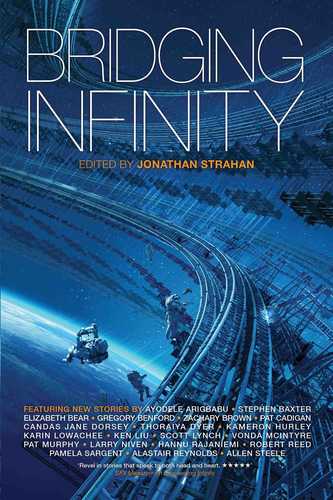 |
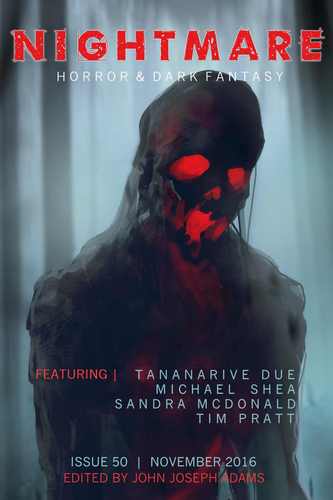 |
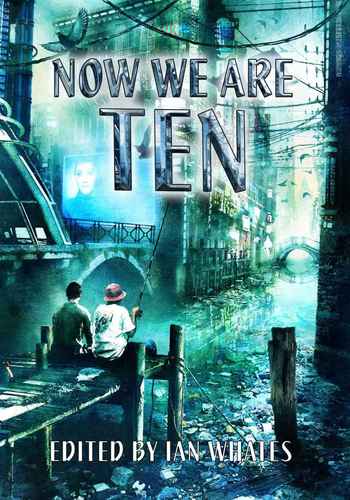 |
Best Editor
When I wrote about this category last year I especially recommended Sheila Williams (Asimov’s), Jonathan Strahan (the Infinity series and other anthologies (including a Best of the Year series), plus stories for Tor.com), and John Joseph Adams (Lightspeed, numerous anthologies, a Best of the Year series). I haven’t changed my mind – a look at my story recommendations shows how many good stories each of them published in 2016. Jonathan Strahan, besides the anthologies Bridging Infinity and Drowned Worlds, was the acquiring editor for one of the very best novellas of the year, The Dream-Quest of Vellitt Boe. John Joseph Adams edited one original anthology, What the #@&% is That?, a horror-oriented book, plus Lightspeed, from which I chose three stories for my anthology; and Nightmare, a horror e-zine. And Sheila Williams, of course, continues to edit Asimov’s with remarkable distinction – every year that is the magazine with the most stories I consider for my book, including four that made my book this year, all of which will likely be on my Hugo nomination ballot.
So once again I’ll nominate all three of those folks. The other two editors of Big Three magazines are certainly worthy as well – C. C. Finlay at F&SF and Trevor Quachri at Analog (which to my mind continues to improve). And Andy Cox’s work at Interzone and Black Static is impressive as well. And then of course there is Clarkesworld, edited by Neil Clarke and Sean Wallace. Neil is also editing a Best of the Year book, and he has been doing original anthologies as well (though none appeared in 2016). Sean is also co-editor of a very strong horror e-zine, The Dark. Clarkesworld in particular had a very strong year indeed in 2016. The other e-zine that really stood out in 2016 was Beneath Ceaseless Skies, edited by Scott H. Andrews, from which I chose 3 stories (and could have chosen K. J. Parker’s excellent “Told by An Idiot” as well.) I’ve said it before, and I’ll say it again – Beneath Ceaseless Skies is I think indisputably the best Fantasy-oriented ezine there is. To mention one more name – Ian Whates, at NewCon Press. He published two original anthologies this year, Crises and Conflicts and Now We Are Ten, from each of which I chose a story for my book. (Now We Are Ten, in particular, is a first-rate book from top to bottom.) And he is also the acquiring editor for one of the best novellas of the year, Alastair Reynolds’ The Iron Tactician.
I haven’t even mentioned the two most decorated contemporary editors, Ellen Datlow and Gardner Dozois. And they of course remain exceptional editors. This year I didn’t see as much original short fiction from either of them (though both put out Best of the Year books), but Datlow was the acquiring editor for one of the best novellas of the year, Victor LaValle’s “The Ballad of Black Tom,” as well as other work for Tor.com. Gardner’s 2016 work was mostly reprints – his landmark Best of the Year series, as well as his role as reprint editor for Clarkesworld.
In Best Editor, Long Form, I bow out. Between the fact that I just haven’t read enough 2016 novels, and that even if I have, I’m not always sure who was editorially responsible, I really can’t speak with any authority.
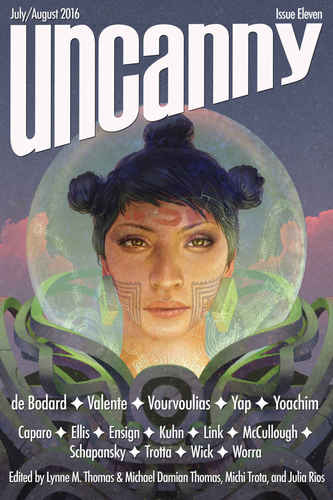 |
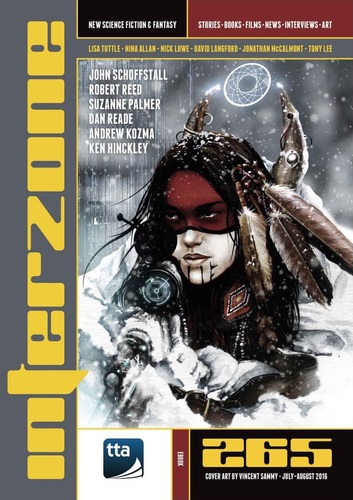 |
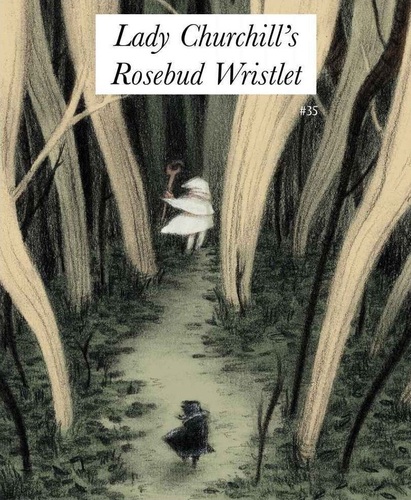 |
Other Hugos
I’m going to bow out of the rest of the Hugo categories as well. This doesn’t mean I don’t think highly of those categories – I do! But I just can’t say much intelligent about any of them. I have my favorite artists, but I forget, sometimes, what they’ve done lately. I don’t read graphic novels (and please don’t take that as a dis – it’s more a matter of “so many books, so little time.”) For Best Semiprozine, I asked for a list of the currently eligible Semiprozines. Off the top of my head, I thought of Beneath Ceaseless Skies, Uncanny, and Interzone. I was quickly reminded of a brand new semiprozine, Mothership Zeta, which is definitely worth nominating as well. (Alas, it is going on hiatus more or less as I write!) And I was pointed to a list of semiprozines, here. There are a lot of really good candidates there — I am probably leaning in the direction of the venerable and always original Lady Churchill’s Rosebud Wristlet.
I am more or less clueless on podcasts. And I don’t know what’s been good this year in related work – please enlighten me! Though actually one book stands out … Alvaro Zinos-Amaro’s Traveler of Worlds: Conversations with Robert Silverberg. And one more candidate – from which I have only read excerpts – Chris Offutt’s My Father, the Pornographer, about his father, SF writer Andy Offutt, who was a very prolific writer of pornography.
Campbell
Finally, the John W. Campbell Award for Best New Writer. This is given to the best writer whose first professional publication in the SF or Fantasy field appeared in the past two years (2015 or 2016). Writertopia has a page, not guaranteed to be complete, with a list of eligible authors.
From that last, a couple of names stand out for me. One is Charlotte Ashley, whose story “A Fine Balance” is in my upcoming Best of the Year book, and her first pro sale, “La Heron,” was pretty close to being in last year’s book. The other is Ada Palmer, for her impressive first novel, Too Like the Lightning, which I have already discussed. Other new writers who have particularly impressed me include Nin Harris, Malka Older, T. R. Napper, Steve Pantazis, Sunil Patel, Laurie Penny, Eric Reynolds, Tamara Vardomskaya, and Benjamin C. Kinney.
Rich Horton’s last article for us was a Retro-Review of the June and July 1962 issues of Fantastic. His website is Strange at Ecbatan


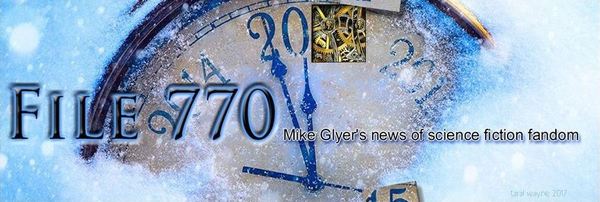
My problem with Dramatic Presentation Short Form is that while I do watch a fair bit of TV, these days, most of the things I like (The Magicians, e.g.) I want to nominate the entire season for Long Form rather than trying to pull out a specific episode.
[…] LOOKING FOR IDEAS. Black Gate has compiled Rich Horton’s recent blog posts in “Hugo Nomination Thoughts, 2017”, including numerous recommendations in the fan categories which few people […]